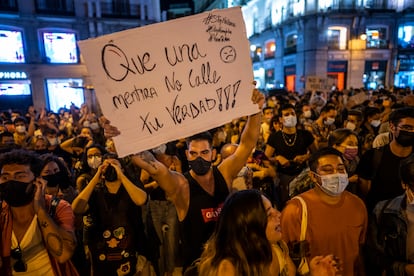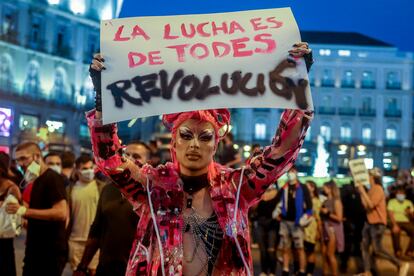Gay man who reported homophobic gang attack in Madrid admits he made it up: ‘It was consensual’
The 20-year-old claimed he was assaulted by a group of eight hooded men in the entrance to his apartment building. He now says he lied to hide the truth from his partner


The pieces of the puzzle did not fit together. The security cameras in the area, checked by the police, did not record anything to corroborate the story offered by the alleged victim: that he had been assaulted by eight individuals wearing hoods in the entrance to his apartment building on Sunday, in the central Madrid neighborhood of Malasaña. He also claimed that they insulted him with homophobic slurs before carving the word “maricón” (faggot) into one of his buttocks before leaving.
Residents, interviewed by the police, said that they hadn’t “heard or seen anything,” despite the supposed attack having taken place in broad daylight. Nor did the owner of a store, where the victim claimed to have been, remember seeing him. There was not a single witness to the alleged crime.
Investigators from the police station where the 20-year-old filed his report, as well as officers from the Provincial Information Squad in Madrid, were unable to verify his account of events. On Wednesday, during a more “unhurried” interview, the man changed his story. “It was consensual, in the house of another person with whom I had a sexual relationship,” he confessed to the police. He explained that he had lied in order to keep the truth from his current partner.
Reports of the case earlier this week, which also claimed that the young man had suffered a knife wound to his lip as well as to his buttock, prompted a wave of reactions. Even the Spanish prime minister, Pedro Sánchez, shared a message via his official Twitter account in which he condemned the “homophobic attack” and convened an emergency meeting for this Friday of the Commission Against Hate Crimes.

Interior Minister Fernando Grande-Marlaska has since confirmed that the meeting will still go ahead. LGBTQ+ associations called for protests in the wake of the alleged assault, but the new statement of the supposed victim has left investigators with no case, and the young man could now face charges for making a false statement.
Investigators were somewhat puzzled by the case from the start, given that the man was unwilling to file a complaint and was “dragged” to the police station to do so by his partner. Both the supposed victim’s roommate and his partner assured police that he had told them the same version of events when he had arrived home that morning with the aforementioned knife injuries. But it was not until 5pm on Sunday that they finally decided to go to the police. On the way there they encountered a patrol car, and the supposed victim gave the officers his account of the incident. They urged him to immediately file a report.
Investigations by the officers did not find anything that corroborated the version of events they had heard. There were no suspects, witnesses or evidence – not even the clothes that he was wearing that day, which he said he had washed. Given this lack of evidence, officers opted to interview him for a second time, which is when he admitted he had lied.
Speaking on Wednesday on Spanish TV network La Sexta, after the man had admitted lying, the interior minister stated that this incident was a “mere anecdote” and that it should not be used to play down the problem of homophobia in Spain. “If we trivialize what has happened, many people will feel even more coerced,” Grande-Marlaska stated. People who would normally file a report may [end up] not doing so, as maybe they will think that no one will believe them. The only thing I am calling for is that irresponsible voices not be heard.”
The LGBTQ+ collective that had organized a demonstration on Wednesday evening in the central Puerta del Sol square decided not to cancel despite the development in the case. “Do you know why?” a statement released on Instagram by Movimiento Marika Madrid said. “Because in recent days there have also been [homophobic] attacks in Toledo, Melilla, Castellón and Vitoria. Because they killed Samuel for being queer,” in reference to the recent fatal beating of Samuel Luiz, a young homosexual man who died after being attacked by a group who also proffered homophobic insults during the incident.
The COGAM LGBTQ+ collective in Madrid has also opted not to cancel its protest planned for this weekend in Sol. “The reality is that the victims are out there, and they are created every day, throughout the country. And that’s why it makes sense to keep the demonstration,” explained Carmen García de Merlo, the president of COGAM, Pilar Álvarez reports. “We are keeping it so that we can protest because Madrid has two laws that are not being complied with [one covering trans people and another generic LGBTQ+ law, both of which were passed in 2016]. And because we can’t leave the victims to one side. Tomorrow it could be any one of us.”
Ignacio Paradero, the secretary of the Organization of the State Federation of Lesbians, Gays, Trans and Bisexuals (FELGTB), agreed. “The rise in cases continues to be there, even though the one in Malasaña was false,” he said. “That doesn’t erase the number of offenses that there are, nor those that have happened over recent days. Cases such as this, of course, do us damage. There will be people who try to take advantage of this to say that hate crimes are not true, but there has been a growth in cases and since the murder of Samuel Luiz there is fear among the collective.”
Rise in assaults
Figures from the Interior Ministry reflect that, in the first six months of this year, the police and Civil Guard have received 610 reports related to hate crimes, which is 9.3% up on the same period in 2019, when there were 558 – a previous record since these statistics began to be tracked in 2014. A recent survey carried out by the same ministry revealed that just one in 10 people who suffer a hate crime report it to the police.
In 2020, there were 1,401 reports of hate crimes, which was 17.9% fewer than in 2019 when there were a total of 1,706. These offenses have grown year after year since 2003. The Interior Ministry points to the effect of the coronavirus pandemic for the fall in the figures seen last year, given that citizens were locked down in their homes for several months in the spring and social activities were severely limited for the rest of the year.
José María Núñez Blanco is the president of the Fundación Triángulo, which was founded in 1996 and is aimed at achieving equality of political and social rights for gays, lesbians, bisexuals and trans people. “The data are overwhelming,” he said. “One false report does not change the fact that there are thousands that are real. This [case] does us a huge amount of harm. The characteristics of the reported facts and their apparent brutality gave it a lot of significance,” he admitted. But he added that there is currently a spike in homophobic cases, “both in cities and in towns,” and that “the rise in hateful discourse” is among the reasons for this.
English version by Simon Hunter.
Tu suscripción se está usando en otro dispositivo
¿Quieres añadir otro usuario a tu suscripción?
Si continúas leyendo en este dispositivo, no se podrá leer en el otro.
FlechaTu suscripción se está usando en otro dispositivo y solo puedes acceder a EL PAÍS desde un dispositivo a la vez.
Si quieres compartir tu cuenta, cambia tu suscripción a la modalidad Premium, así podrás añadir otro usuario. Cada uno accederá con su propia cuenta de email, lo que os permitirá personalizar vuestra experiencia en EL PAÍS.
¿Tienes una suscripción de empresa? Accede aquí para contratar más cuentas.
En el caso de no saber quién está usando tu cuenta, te recomendamos cambiar tu contraseña aquí.
Si decides continuar compartiendo tu cuenta, este mensaje se mostrará en tu dispositivo y en el de la otra persona que está usando tu cuenta de forma indefinida, afectando a tu experiencia de lectura. Puedes consultar aquí los términos y condiciones de la suscripción digital.








































